Affiliate links on Android Authority may earn us a commission. Learn more.
Samsung Galaxy S10 Lite vs Note 10 Lite: Pick your poison
March 6, 2020
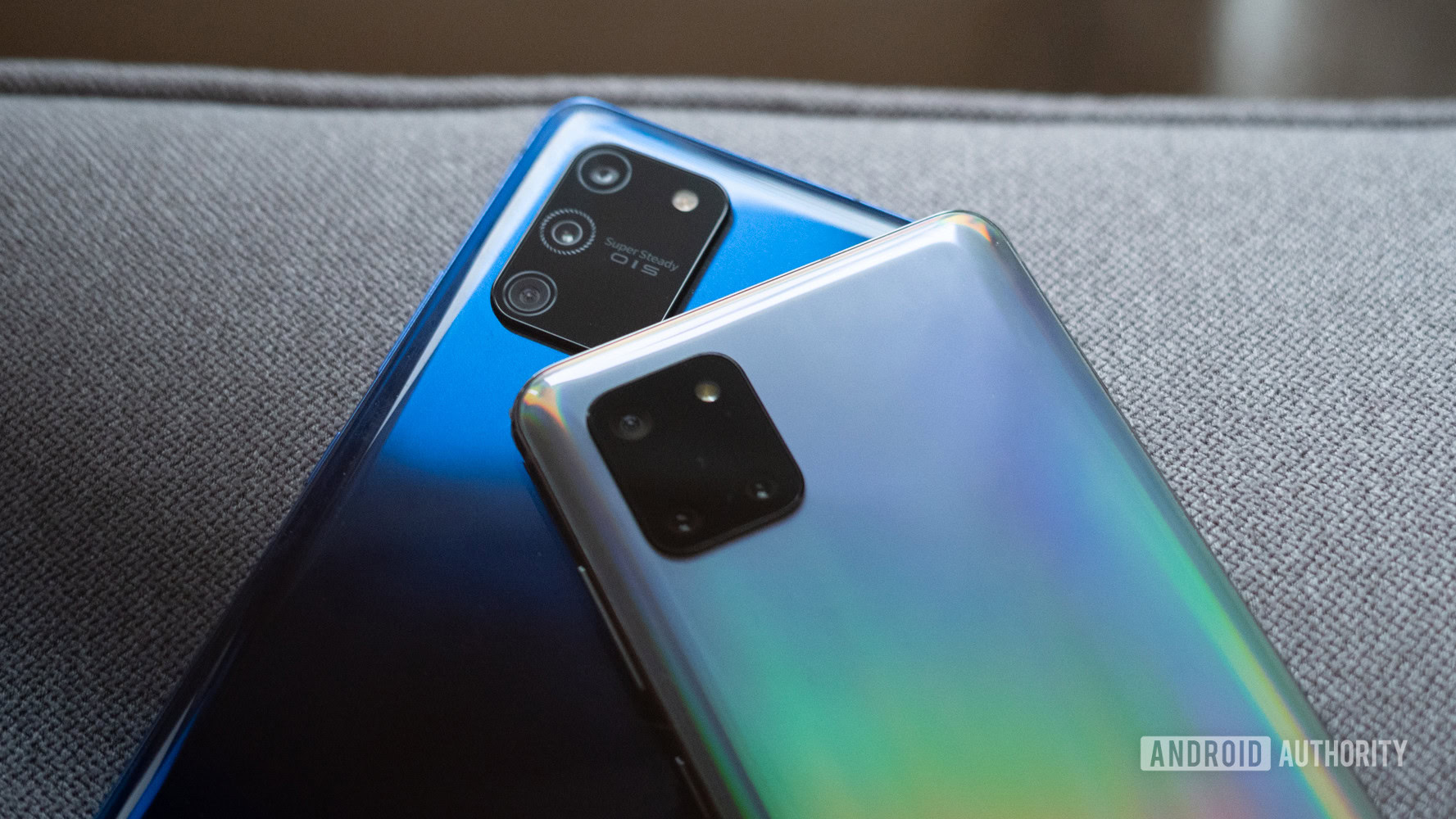
A top-of-the line phone brings with it amazing specifications, but also an increasingly higher price tag. Sometimes all you want is great value for your money. OnePlus has been the torch bearer in this segment, offering all the essentials while skipping out on superfluous extras. The end result is a phone that gets you most of the must-have features at a significantly lower price point.
Samsung traditionally reserves its best features and performance for the Galaxy S and Galaxy Note series. While the A-series gave us some interesting hardware, there were notable omissions. Then Samsung threw the one-two punch of the Galaxy S10 Lite and the Note 10 Lite. Is Samsung finally taking the affordable flagship segment seriously? If our Galaxy S10 Lite review is anything to go by, 100% yes!
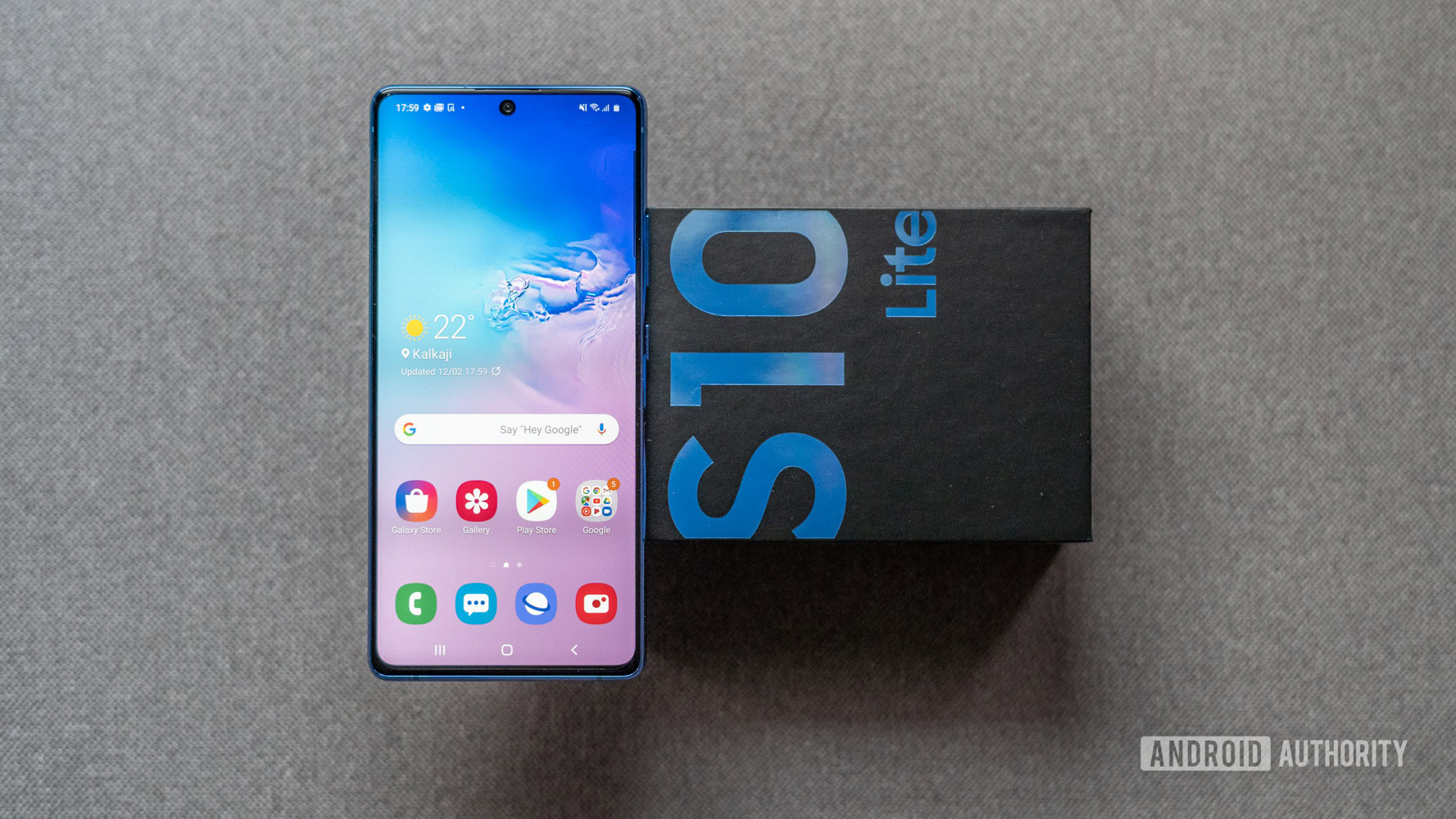
So now that there are two affordable options from Samsung at comparative price points, which one is better for you? What are you missing if you pick one over the other, and, more importantly, which one gives you more bang for your buck? We discuss these points in the Android Authority comparison of the Samsung S10 Lite vs the Note 10 Lite.
Design
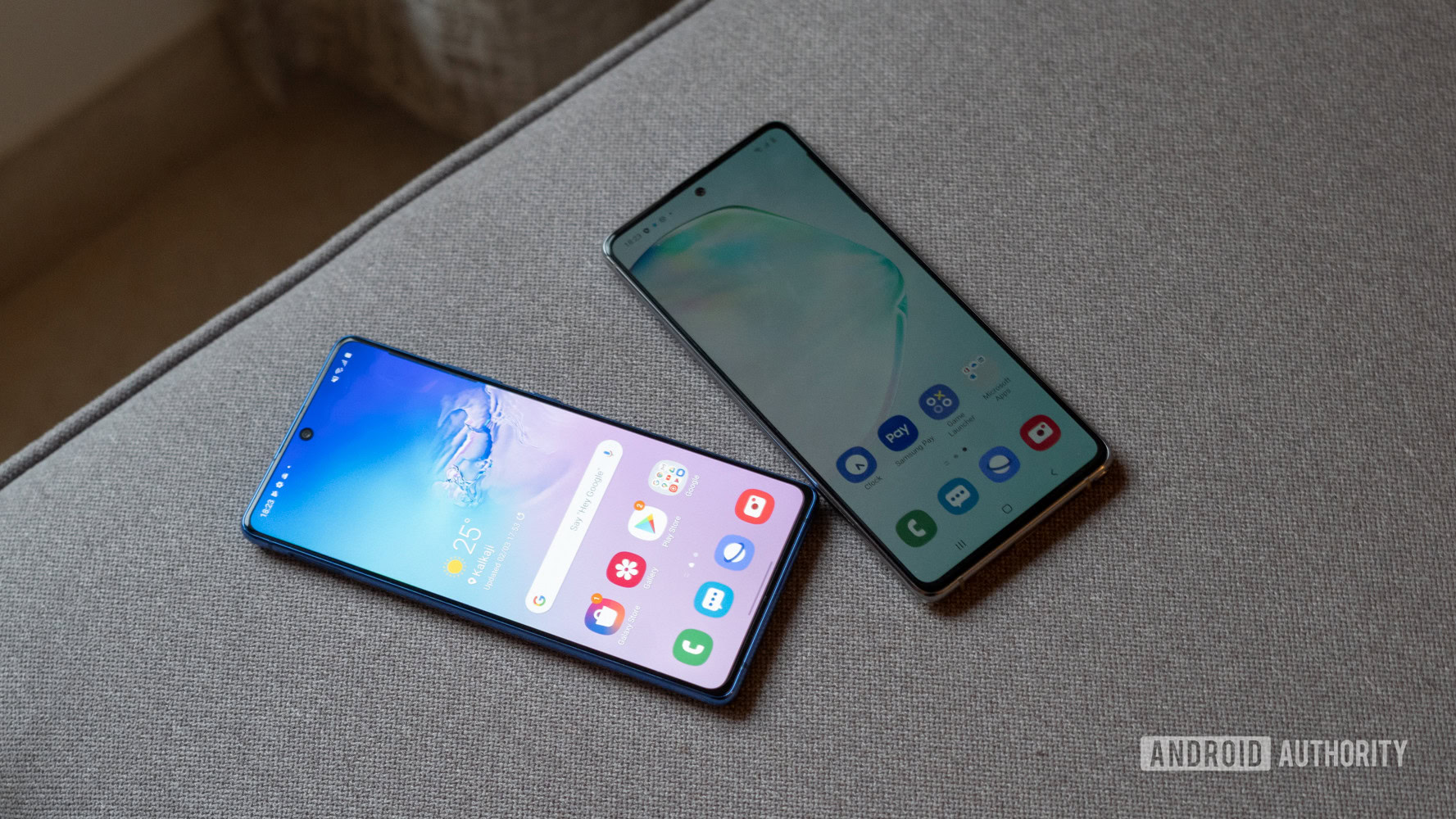
There’s a certain homegeneity in design that permeates Samsung’s products. The Galaxy S10 Lite and Note 10 Lite embody this wholeheartedly. In fact, the two phones would fit right in with Samsung’s new S20 series of phones.
Up front the designs are exceedingly similar, which makes it hard to differentiate between them. Other than the minor difference in physical sizes, the two phones are nigh identical —down to the centrally mounted punch hole selfie camera.
Differences in the hardware are hard to spot.
The display size on the Galaxy S10 Lite and Note 10 Lite is exactly the same at 6.7-inches, and the resolution also matches up at Full HD+. The S10 Lite seemed to have slightly worse contrast, but the difference was minimal enough that it might just be the variance between panels.
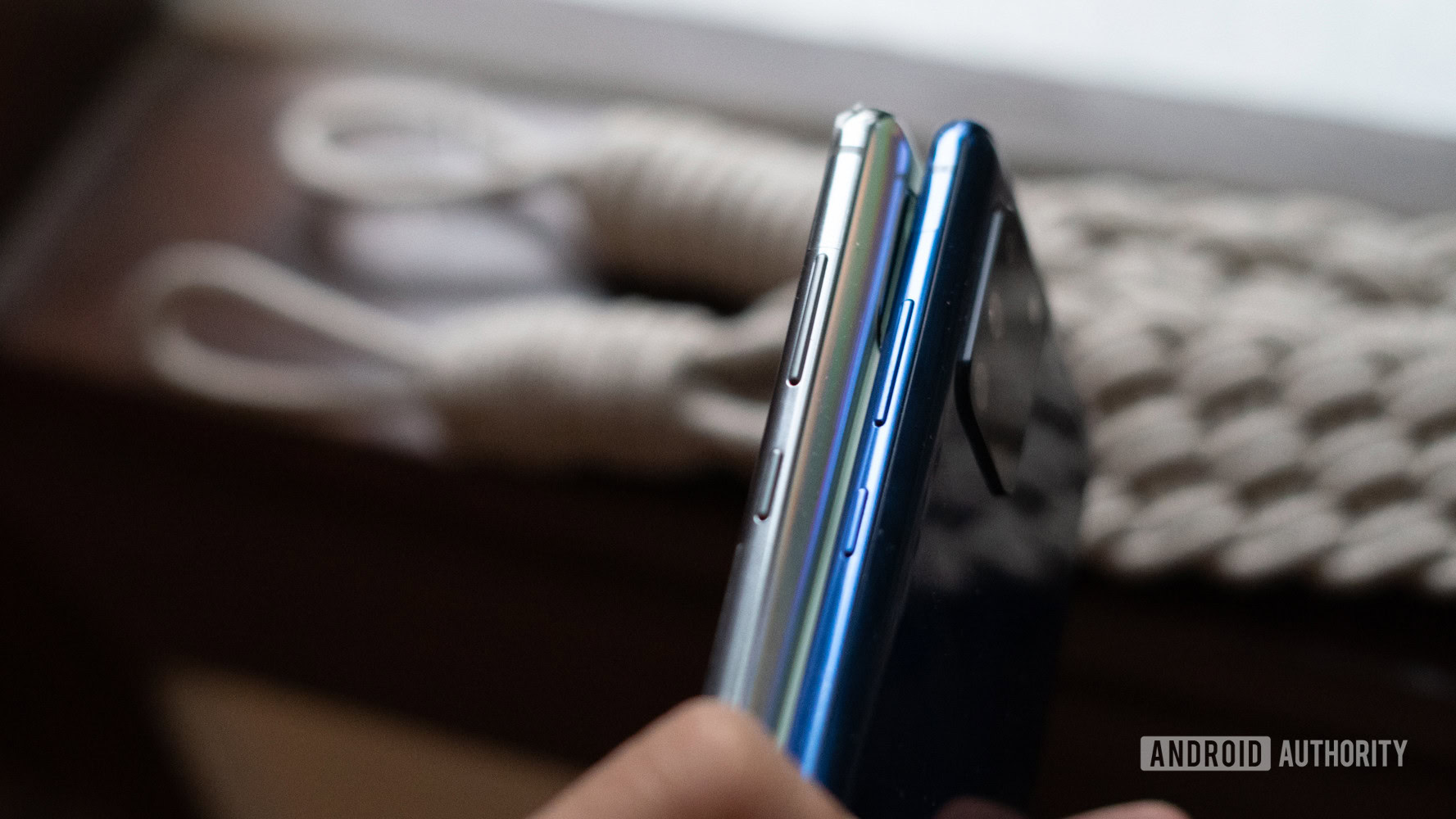
Differences in the hardware are hard to spot. The S10 Lite power button is seated slightly lower than that of the Note 10 Lite. Stunningly, the S10 Lite omits the headphone jack, something the Note 10 Lite holds on to. You will, of course, spot a slot for the S Pen along the bottom edge of the Note 10 Lite. The S Pen doesn’t support air gestures like those found on the Note 10 Plus, but it works perfectly well for capturing notes or doodling.
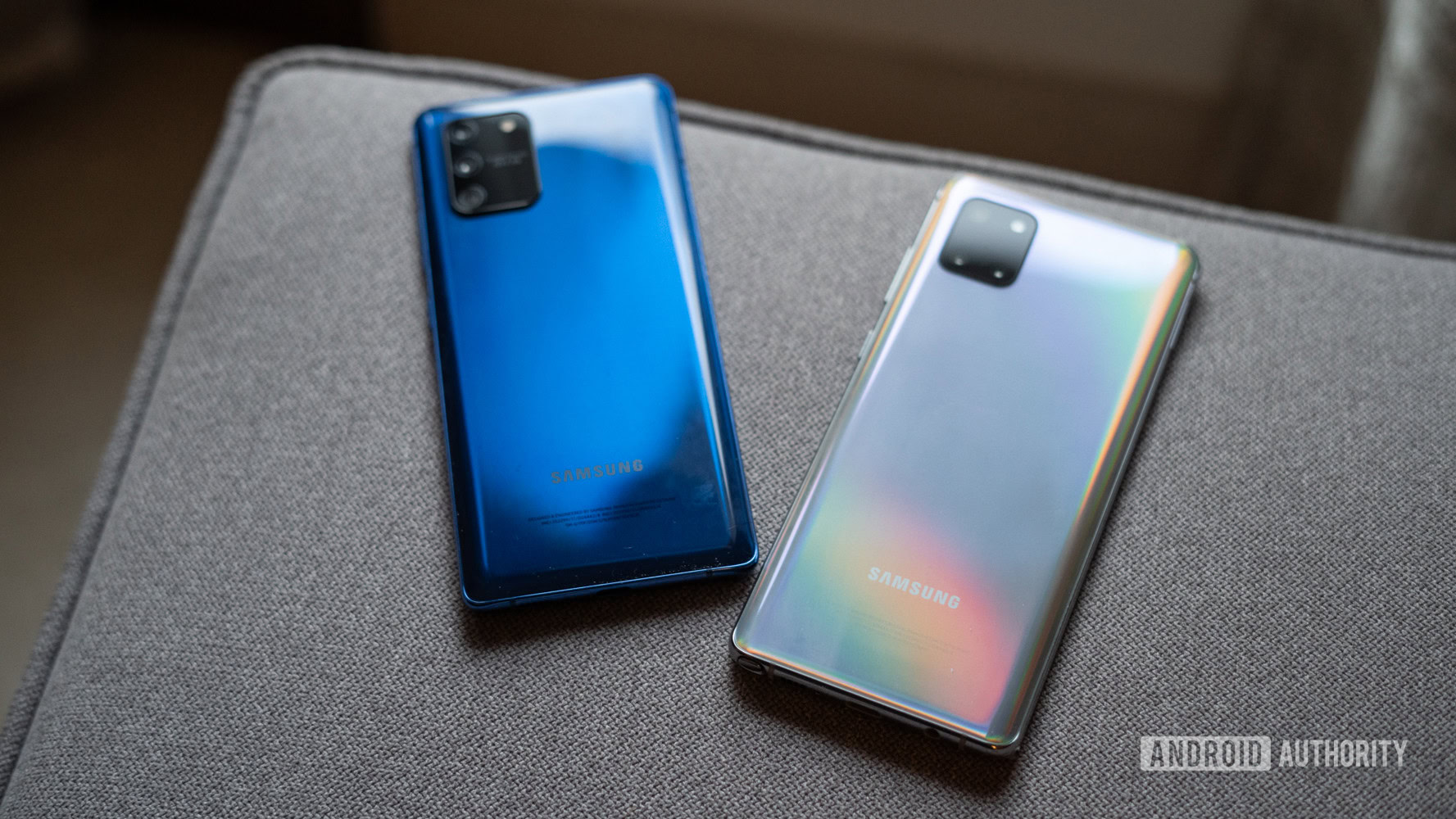
The back of the phones exhibit more noticeable differences. To start, the camera assembly on the S10 Lite is very clearly designed to sit in line with the S20 series. There is a particular emphasis on the Super OIS technology built in for gimbal-like video capture. Meanwhile, the Note 10 Lite looks a bit humdrum.
The backs of both phones are fingerprint magnets, and keeping them clean is a hassle.
Both phones have extremely fingerprint-prone back panels. You’ll find Samsung’s “glass-tic” material here — a polycarbonate blend of sorts that makes the material feel like glass, but not quite enough. It is nearly impossible to keep clean. I’m not a fan.
Performance
Galaxy S10 Lite
- Snapdragon 855
- 6/8GB RAM
- 128/512GB storage
- microSD expansion
Galaxy Note 10 Lite
- Exynos 9810
- 6/8GB RAM
- 128GB storage
- microSD expansion
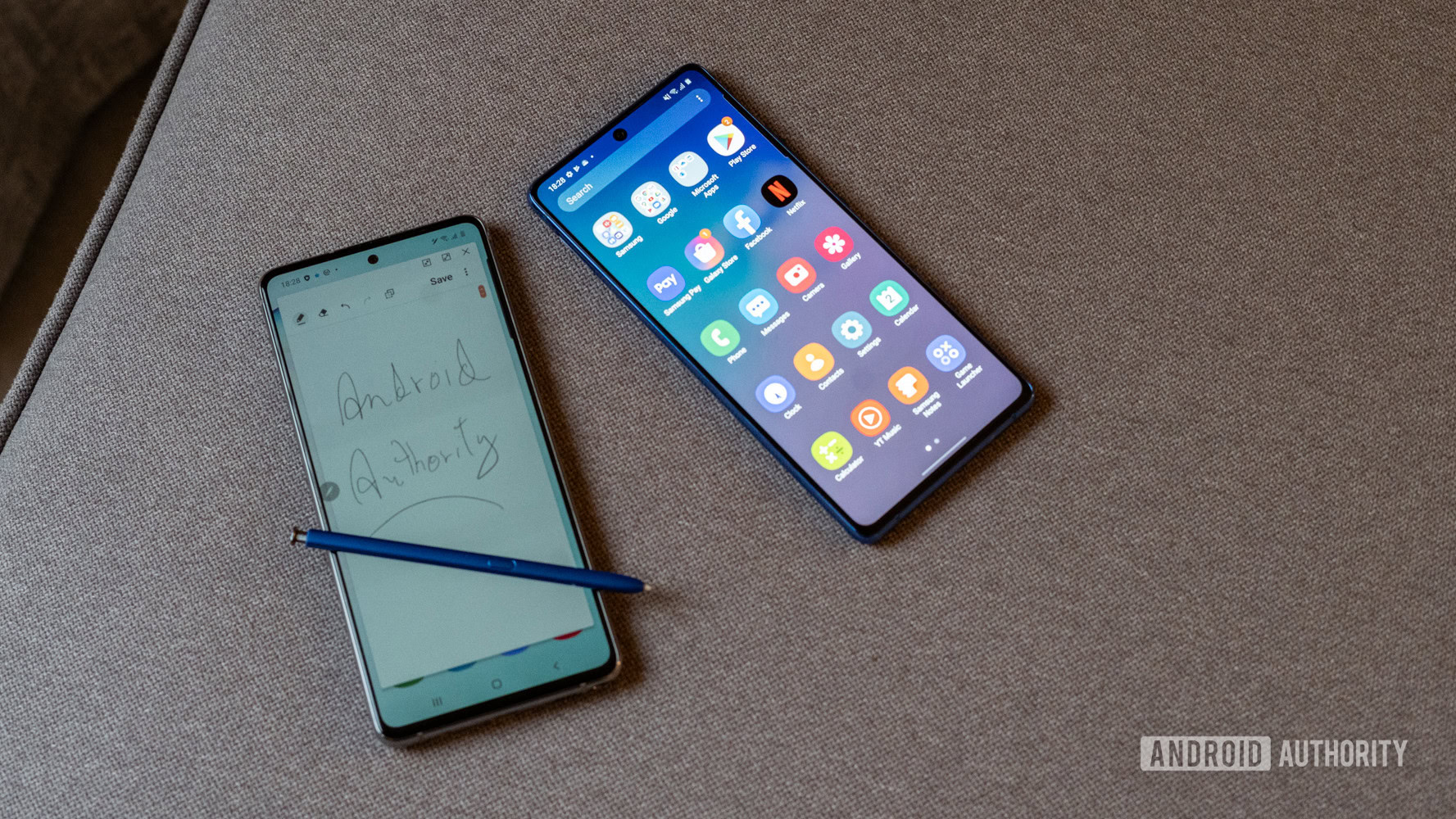
Under-the-hood performance is where you start to notice significant differences between the two phones. To start, the S10 Lite is powered by a Snapdragon 855 chipset. A powerful processor by any measure, it is widespread among 2019 flagships. Meanwhile, the Note 10 Lite sports an Exynos 9810 chipset. The 9810 isn’t slow by any means, but it is a 2018 chipset that isn’t really a match for the Snapdragon 855.
While day-to-day use is similar, I noticed the Note 10 Lite took just a bit longer to load up intensive games. If you don’t imagine yourself to be playing a lot of games, you might be okay with the Exynos-powered Note 10 Lite. Using a chipset that’s a generation older, however, means the Note 10 Lite hardware might not be as fresh as the S10 Lite a couple of years down the line. Definitely something to keep in mind.
Pit against each other, the performance difference is very obvious to see using benchmark figures. The Snapdragon 855 chipset in the S10 Lite scores far higher than the Note 10 Lite’s Exynos 9810.
The Exynos 9810 in the Note 10 Lite is a generation older than the Snapdragon 855 in the S10 Lite.
Elsewhere, RAM and storage options are essentially the same. Each comes with either 6GB or 8GB of RAM and 128GB of storage. The S10 Lite does get an additional 8GB/512GB variant. Regardless, storage on both phones can be expanded using a microSD card, albeit at the expense of a second SIM card slot. Yes, both phones have a hybrid SIM slot.
The Galaxy S10 Lite and Note 10 Lite run Android 10 with the latest version of One UI 2.0. Samsung has really picked up the pace with feature additions, and both devices have already received the latest security patch issued by Google. One UI in itself is a polished experience and strikes a good balance between fluidity and feature set.
Battery
Galaxy S10 Lite
- 4,500mAh
- 45W charging
Galaxy Note 10 Lite
- 4,500mAh
- 25W charging
Battery capacities on both phones are identical at 4,500mAh. Charging speeds, however, are very different. The S10 Lite supports 45W fast charging while the Note 10 Lite is capped at 25W.
Battery life isn't an issue on either phone, but the S10 Lite offers much faster 45W charging.
On average, I could easily get a full day of battery life out of either phone. However, the S10 Lite was a bit more frugal while on standby. This resulted in overall longer battery life. Neither phone will have you worrying before the end of the day, but the S10 Lite will get you that extra range when you’re out late without a charger on hand.
Camera
Galaxy S10 Lite
- Rear:
- 48MP (f/2.0) primary
- 12MP ultra-wide
- 5MP macro
- Front:
- 32MP
Galaxy Note 10 Lite
- Rear:
- 12MP (f/1.8) primary
- 12MP telephoto
- 12MP ultra-wide
- Front:
- 32MP
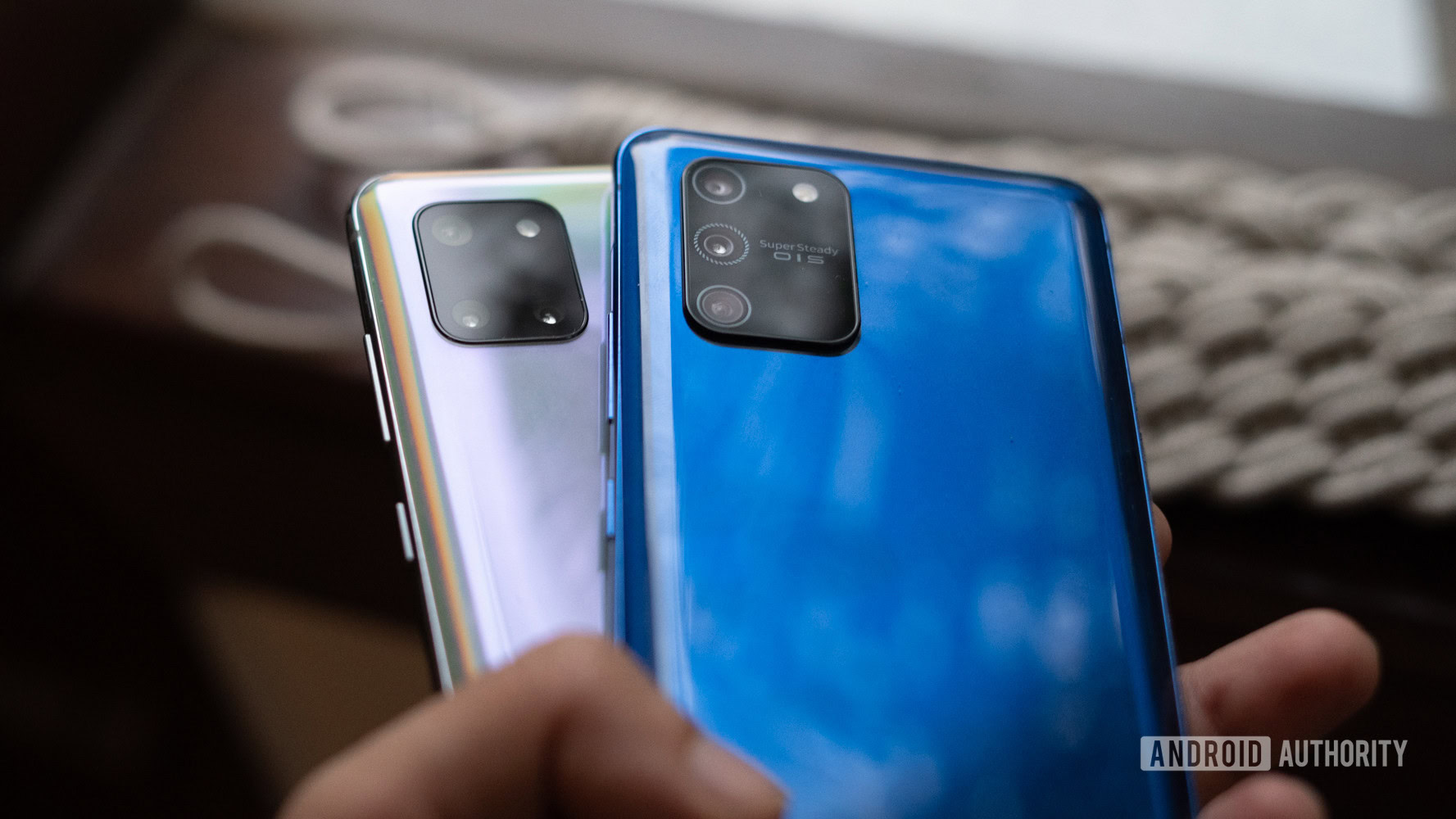
Imaging really sets the two phones apart. The S10 Lite has a 48MP primary shooter equipped with Samsung’s Super Steady OIS technology. Additionally, the phone has a 12MP ultra-wide camera as well as a 5MP macro sensor. Meanwhile, the Note 10 Lite employs a more conventional 12MP shooter in addition to 12MP telephoto and ultra-wide lenses. The difference in the primary sensors and associated camera calibration is very apparent.
The pixel-binned 12MP shot from the S10 Lite looks just a bit cleaner with slightly more pronounced bokeh effect. However, the color accuracy is completely off. It imparts an almost pink hue to the flower. Meanwhile, the shot from the Note 10 Lite wasn’t as sharp, but it comes close to the actual color of the flower.
Indoors, things are a bit different. The S10 Lite’s pixel-binned camera is able to brighten low-light images that are low on noise and have more natural looking colors. The image captured by the Note 10 Lite appears a bit washed out in comparison.
Shooting ultrawide, there is a very noticeable difference in how the two cameras approach exposure and imaging. The S10 Lite opts for a lower exposure to retain more details in the clouds and shadow regions. The Note 10 Lite’s shot turned out to be blown out and displayed blown out highlights. Neither phone was perfect, and the actual setting was somewhere halfway between the two exposure values chosen by the phones.
Overall, the two cameras are good enough for the category and excel in different ways.
Video specs are fairly matched across the two. Both phones are capable of capturing 4K at 60fps video following recent updates.
Overall, the two cameras are good enough for the category, and excel in different ways. The S10 Lite is the one to get if you often find yourself shooting in low light. Meanwhile, the Note 10 Lite’s shooter takes more color accurate images outdoors, and is generally a more versatile set-up to boot. You can take a look at full resolution image samples here.
Specs
| Samsung Galaxy S10 Lite | Samsung Galaxy Note 10 Lite | |
|---|---|---|
Display | Samsung Galaxy S10 Lite Super AMOLED 6.7-inch Full HD+ 2,400 x 1.080 20:9 aspect ratio HDR10+ | Samsung Galaxy Note 10 Lite Super AMOLED 6.7-inch Full HD+ 2,400 x 1,080 20:9 aspect ratio HDR |
Processor | Samsung Galaxy S10 Lite Qualcomm Snapdragon 855 Adreno 640 GPU | Samsung Galaxy Note 10 Lite Exynos 9810 Mali G72 MP18 |
RAM | Samsung Galaxy S10 Lite 6GB/8GB | Samsung Galaxy Note 10 Lite 6GB/8GB |
Storage | Samsung Galaxy S10 Lite 128GB UFS 2.1 microSD | Samsung Galaxy Note 10 Lite 128GB UFS 2.1 microSD |
Battery | Samsung Galaxy S10 Lite 4,500mAh 45W charging | Samsung Galaxy Note 10 Lite 4,500 mAh 25W charging |
Cameras | Samsung Galaxy S10 Lite Rear: 48MP primary 12MP ultra-wide 5MP macro sensor Front: 32MP | Samsung Galaxy Note 10 Lite Rear: 12MP primary 12MP ultra-wide 12MP telephoto Front: 32MP |
Operating System | Samsung Galaxy S10 Lite Android 10 Samsung One UI 2.0 | Samsung Galaxy Note 10 Lite Android 10 Samsung One UI 2.0 |
Dimensions | Samsung Galaxy S10 Lite 162.5 x 75.6 x 8.1mm 186g | Samsung Galaxy Note 10 Lite 163.7 x 76.1 x 8.7 mm 199g |
Colors | Samsung Galaxy S10 Lite Prism White, Prism Blue, Prism Black | Samsung Galaxy Note 10 Lite Aura Glow, Aura Black, Aura Red |
How do the prices compare?
Samsung Galaxy S10 Lite
- 8GB RAM/128GB storage — 39,999 rupees (~$550)
- 8GB RAM/512GB storage — 44,999 rupees (~$620)
Samsung Galaxy Note 10 Lite
- 8GB RAM/128GB storage — 40,999 rupees (~$570)
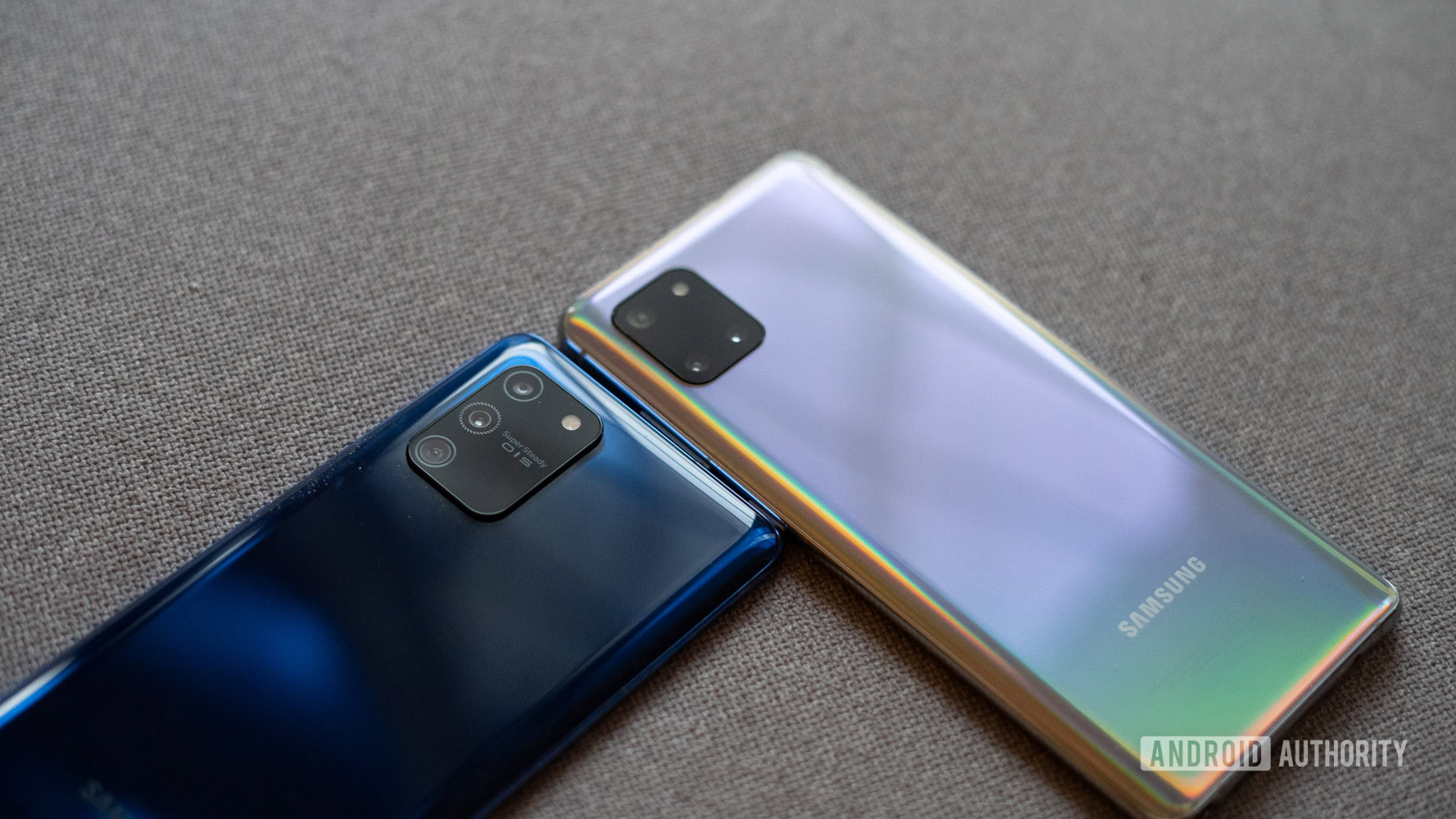
The Samsung Galaxy S10 Lite and Note 10 Lite are both very good phones that target different segments of the market. As such, picking one really comes down to what you want from your phone.
The Note 10 Lite’s highlight feature is the S Pen, whereas the S10 Lite delivers a more well-rounded package. Of course, the phones don’t just compete with each other. The biggest competitor here is the OnePlus 7T. That phone offers up a cleaner Android build, faster Snapdragon 855 Plus chipset and a similar imaging set up. Starting at Rs. 34,999 (~$478), the OnePlus 7T undercuts the Samsung competition in price as well.
Other alternatives include the OPPO Reno 3 or the Redmi K20 Pro. The latter is yet another Snapdragon 855-toting phone that you can buy for less than Rs. 30,000 (~$410), which makes it a very good deal.
The Galaxy S10 Lite is priced at Rs. 39,999 (~$550) for the 8GB RAM, 128GB storage variant. You can step up to the 512GB variant for a bit more at Rs. 44,999 (~$620).
Meanwhile, the Note 10 Lite is priced at Rs. 40,999 (~$570) for the 8GB RAM, 128GB storage version.
Samsung S10 Lite vs Note 10 Lite: Which one should I get?
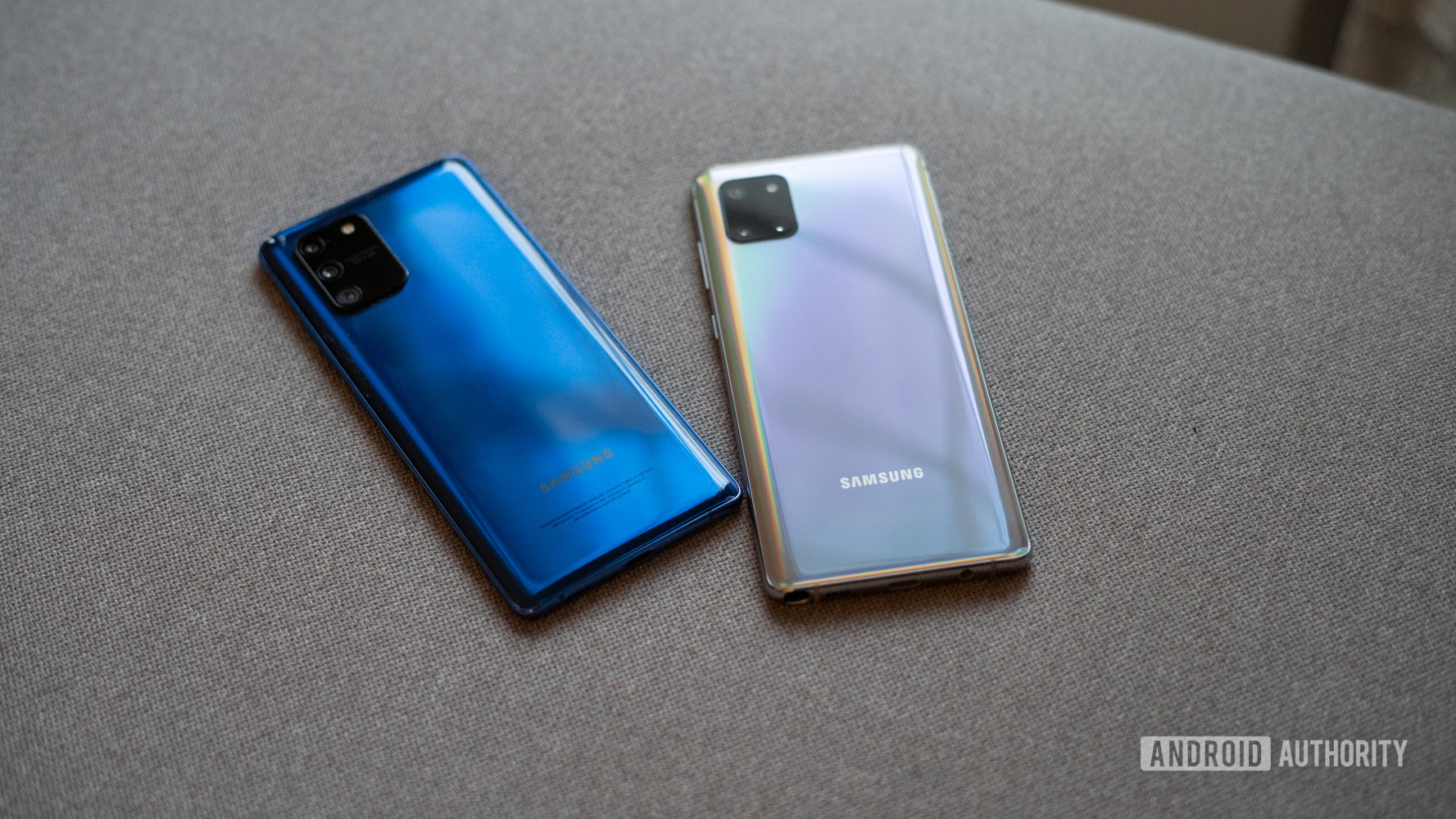
It has taken a while for Samsung to make a proper showing in the affordable flagship segment, but the Galaxy S10 Lite and Galaxy Note 10 Lite are very good devices. They don’t have the absolute latest spec sheets and instead focus on providing just enough paired with a cohesive user experience.
The Galaxy S10 Lite gives you a near-flagship level experience. It is a true return to form for the company and delivers oodles of power, a very good software experience, and cameras that can, for the most part, hold up to the competition. Between the faster Snapdragon 855 chipset, the quicker 45W charging, and the generally better battery life, it makes for an excellent phone. This will likely be the preferred option for most users.
The S10 Lite edges out the Note 10 Lite as the better device unless the S Pen is an essential feature for you.
Meanwhile, the Galaxy Note 10 Lite is for anyone who wants the Galaxy Note 10 Plus experience without spending flagship money. The performance is squarely 2018, but that certainly doesn’t make it a slouch. Additionally, it is the only value flagship around with stylus input. If you want an excellent note-taking device, this is practically your only option. You can’t really go wrong with it.
This is the end of our Samsung S10 Lite vs Note 10 Lite comparison. What’s your choice between the S10 Lite and the Note 10 Lite? Let us know in the comments.